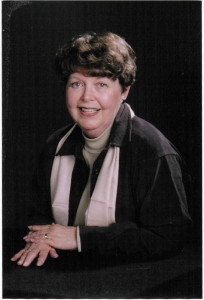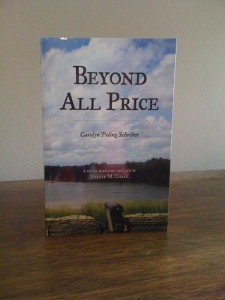Beyond All Price, based on the life story of Nellie M. Chase, a Union nurse during America’s Civil War, was released earlier this year with a virtual launch party that lasted three days. Combining guests interviews and workshops with recipes and other attractions, Carolyn Schriber attracted readers and writers from a variety of genres to participate in and enjoy her unique marketing event.
Carolyn is a historian by training and profession. Here she discusses how that background makes her a more effective novelist.
————————-
THE IMPORTANCE OF RESEARCH by Carolyn Schriber
 As a writer, I have a streak of perversity. No, I’m not into kinky sex scenes or ghoulish fantasy. My own brand of perversity is yielding to the temptation to write something I’m not supposed to be working on.
As a writer, I have a streak of perversity. No, I’m not into kinky sex scenes or ghoulish fantasy. My own brand of perversity is yielding to the temptation to write something I’m not supposed to be working on.
When I was in grad school, just starting to work on my dissertation, I was fascinated by the character of the Norman bishop whose career I was supposed to be studying. I had 134 of his personal letters to provide satisfaction for my curiosity. To me, the bishop was a one of those people you love to hate. I KNEW I couldn’t believe a thing he said. He didn’t call what he did “lying,” I suppose. He just told every person whatever they wanted to hear. So he was perfectly capable of telling the king that his son was plotting against him. Then he could turn around and offer the prince his help in overthrowing his father. He was a hypochondriac, inherently lazy, overly interested in his own personal wealth, and a complete coward when danger threatened. What a great villain he would have made! I could have had a wonderful romp telling his story.
Opposing my views was my dissertation advisor, standing over my shoulder and cautioning, “Read the charters, Carolyn. Don’t listen to what the bishop says. Read what he does.” My supervising committee wanted theory, historiography, background, economic developments, architectural analysis — everything except his personality. I finally caved in to their demands, of course, or I wouldn’t have gotten my degree. But inside was that little voice that said, “Just you wait! One day I’ll tell the REAL stories.”
I continued the scholarly (read “stodgy”) writing for fifteen years, always wanting to be more of a story-teller than the academic world would allow. The classroom was my only outlet, and I admit to telling some favorite scandalous stories to some of my upper-division classes. But retirement held out the real promise to me. At last I could let my imagination run free. I could write what I wanted to write.
 So here I am, five years or so into my retirement and embarked on a new career as a novelist. My next book will be about a small group of Abolitionists who travelled to South Carolina in 1862. Their purpose? To work with the slaves whose masters had abandoned them when the Union Army captured Port Royal Sound and Hilton Head Island. They are a motley bunch — a novelist’s dream. There are both men and women, young and old, religious zealots and fiercely independent Unitarians, They think they have a common goal, but each individual has a different plan as to how best to reach that goal. Their petty squabbles, personal animosities, and dirty tricks furnish enough material for a really juicy novel.
So here I am, five years or so into my retirement and embarked on a new career as a novelist. My next book will be about a small group of Abolitionists who travelled to South Carolina in 1862. Their purpose? To work with the slaves whose masters had abandoned them when the Union Army captured Port Royal Sound and Hilton Head Island. They are a motley bunch — a novelist’s dream. There are both men and women, young and old, religious zealots and fiercely independent Unitarians, They think they have a common goal, but each individual has a different plan as to how best to reach that goal. Their petty squabbles, personal animosities, and dirty tricks furnish enough material for a really juicy novel.
Enter Perversity, stage left. What am I doing with my writing time? I’m deep into scholarly research. I’m still studying people, and the sources of my information are, for the most part, their own letters, diaries, and journals. But now it’s my own inner voice that keeps warning, “Read the newspapers, the military dispatches, and the Congressional Record, Carolyn. Don’t listen to what the gentleman says. Read what he does.”
Could I tell their story with no more information than whatever their letter collections provide? Certainly. But would I be satisfied with the result? Probably not. The curse (or blessing) of an author with historical training is the need to get the facts straight first. Then the story can almost tell itself. More important, that nagging voice is actually making a promise to a future reading audience: “You can trust what you read here. I’ve done my research.”
————————-
Thank you so much for being my guest today, Carolyn. I love to read historical fiction and am in awe of the amount of work and time involved in writing this genre. Since I’m getting a Kindle for Christmas, Beyond All Price is going to be one of the first ebooks I buy.
Carolyn Schriber now writes Civil War novels. Her latest release, Beyond All Price, is available through her Amazon Author’s Page or from Katzenhaus Books. You can also find her on Facebook, Twitter, and LinkedIn.






Hi Patricia and Carolyn – I believe you! And know that the stories you will tell will be as accurate as possible. And you’re so right .. if you’ve dug as deep as you can with the research .. then the story will logically follow through. This makes so much sense .. and is so interesting .. thank you – Hilary
Thanks, Carolyn! Blog awards are fun.
I hope you don’t mind, Patricia —
I have just been awarded a “Versatile Blog award” and according to the rules I must pass it on to seven blogs of my choosing – I’ve chosen you as one of my seven. To claim your badge, go to
http://www.katzenhausbooks.com/blog
Hi, Carolyn –
I think research is critical regardless of genre. And at least historical research isn’t out of date before the book is published, unlike writing contemporary fiction with references to current technology.
Terry
Terry’s Place
Romance with a Twist–of Mystery
Thanks for all the kind comments. I’m still mulling the term “faction.” No, I think I’ll stick with calling my writing “historical fiction.” That’s confusing enough without suggesting that I may be taking sides with one faction or another.
As I see it, historical fiction lets me write factual history whenever I have been able to unearth solid evidence about what happened. It becomes fictional when there is a gap in the historical record, and I have to fill in with plausible suggestions of what I “think” probably happened.
Another way of looking at it is this. I had lots of historical evidence of the military activities that Nellie Chase observed during the Civil War. That’s the historical part. But Nellie left behind no letters or diaries to record what she thought or felt as she witnessed battles and the horrors of war. So, when I create her conversations or thoughts, I’m writing fiction.
Thanks for sharing your passion with us, Carolyn. I’m working on a historical novel loosely based on the history of my Mexican-Chinese ancestors. I’ve found that I have so much fun with the research, sometimes it’s hard to start writing. I just want to keep unearthing more background, reading obscure histories and traveling to strange corners. It’s all quite an adventure.
With that much research, it sounds like your books border on non-fiction or perhaps faction. You’ve certainly put your passion to good use!
That is a lot of research! At least it’s your passion.
Patricia and Carolyn,
Thanks for posting this.
Research is important, and fascinating.
Donna V.
http://donnasbookpub.blogspot.com
Thanks, Patricia and Carolyn.
I for one am glad research is so important because I love it. It’s fun putting the pieces together.
Hello Patricia and Carolyn,
Thanks so much for sharing this! I am in the early research stages for a historical fiction novel, so this info is timely.
Have a good weekend,
Karen
Good morning, Margot.
And Carolyn, thanks so much for being my guest today. It’s always a pleasure working with you.
Patricia – Thanks so much for hosting Carolyn.
Carolyn – You are so right about research! I suppose it’s because of my academic background, but solid research is really important to making a book believable, isn’t it? And I am a fan of historical fiction, so I look forward to reading your novel. I wish you much success with Beyond All Price.